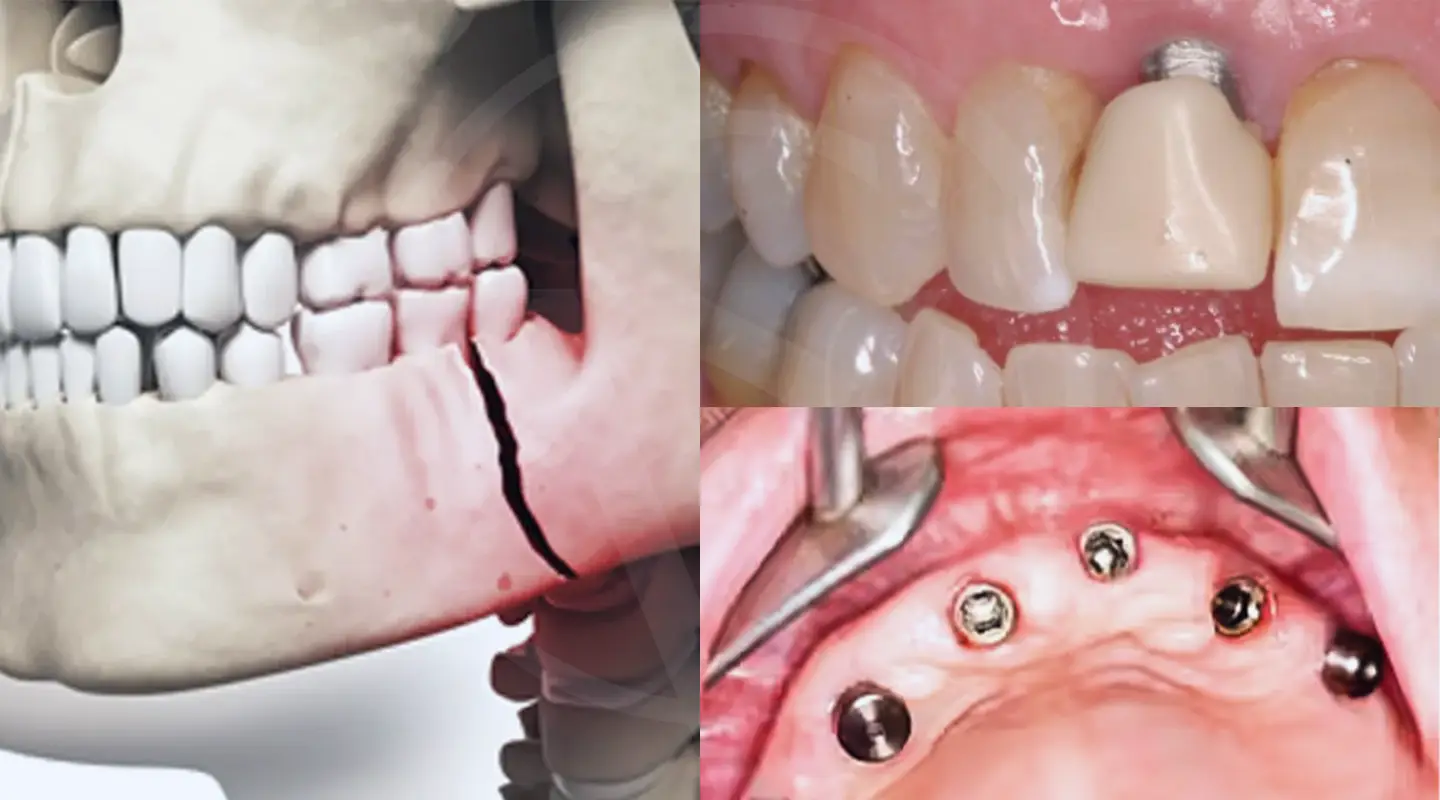What problems can occur after dental implant surgery?
Dental implants are often lauded as durable and aesthetically pleasing options for replacing missing teeth. But like any medical intervention, there are still risks involved. Some patients may find they have problems during the healing stage or sometimes later on that may compromise the success of the implant. The good news is that many of these issues are minor, treatable, and often preventable with appropriate care and timely attention.
In this article, we will describe the most common problems associated with dental implants, the causes, problems, symptoms to look for, and when to seek assistance from your dentist so you can help protect your smile and all of the benefits that come with your implant.
Problems During the Healing Phase (Early Complications)

The first few weeks following dental implant surgery are a fragile time as the body is integrating the implant with the bone of the jaw. Most patients progress along the healing continuum without issue but there can sometimes be complications that interfere with the stability of the implant. Knowing about these possible problems can help you respond quickly if any symptoms appear. Below are the most common dental implant problems during the healing phase:
Lack of Osseointegration (Implant Failure)
Osseointegration, the process in which the implant bonds to the jawbone, is one of the most important aspects of implant success. If successful osseointegration does not occur, the implant does not stay stable.
- Definition: The implant is not bonding firmly enough to the bone.
- Causes: Poor bone quality or quantity, loading the implant too soon, smoking, systemic conditions, that affect other areas of the body (uncontrolled diabetes), surgical error, and/or infection.
- Symptoms: Mobility of the implant, persistent pain, swelling and tenderness.
Infection (Peri-Implantitis – Early Onset)
Infectious events related to implant site is one of the most common early complications. If bacteria penetrate the healing tissues, they can interfere with recovery and weaken the implant.
- Description: When bacterial infection occurs in tissue around the implant.
- Causes: Poor oral hygiene, contamination during surgery, leftover dental cement, or periodontal (gum) disease.
- Symptoms: Redness, swelling, pain, pus or drainage, and if severe, fever or malaise.
Nerve Damage
While infrequent, nerve damage can occur when an implant is placed too close to important nerve pathways in the jaw. This type of complication is usually noticed right after surgery.
- Description: Trauma or compression of the nearby nerve caused by implantation.
- Symptoms: Numbness, tingling, burning sensations, or altered sensation in the lips, tongue, chin or gums. These may be temporary in nature but may persist if left untreated.
Sinus Perforation (Upper Jaw Implants)
For implants placed in the maxilla (upper jaw), there is a chance that the implant itself goes up into the maxillary sinus cavity. This is often caught and managed during surgery by the dentist but could result in symptoms of mild to moderate discomfort in the short term.
- Description: The implant has penetrated into the maxillary sinus cavity.
- Symptoms: Pain, pressure, or congestions in the sinus. Possible symptoms may also include and are not limited to, temporary nosebleeds and/or symptoms of a sinus infection.
Long-Term Dental Implant Problems (Late Complications)
Complications associated with dental implants can arise many months or years after healing has occurred. These long-term issues are typically related to lifestyle behaviors, oral hygiene and/or mechanical factors that could affect the implant or its surrounding structures. Recognizing the warning indicators allows for timely intervention and enhances the chances for long-term success of any implant. Below are listed some of the most frequently reported problems with dental implants that can manifest in the long-term.
Peri-Implantitis (Late Onset)
Implants, like natural teeth, are subject to gum disease as well, called peri-implantitis. Peri-implantitis is a chronic infection that affects the gum tissue around the implant, as well as the supporting bone. If not addressed, it can ultimately lead to the loss of the implant.
- Description: Inflammation and bone loss around the implant in a manner similar to periodontitis.
- Causes: Poor oral hygiene; smoking; uncontrolled diabetes; excessive overload; extra cement remaining from the crown.
- Symptoms: Bleeding gums around the implant; redness; swelling; deep periodontal pockets; progressive implant mobility.
Implant Crown and Bridge Issues
Although the titanium implant itself is very durable, the actual crown or bridge crown on top of the implant can face a fair amount of wear and tear over time.
Chipping or Fracture of Crown
- Causes: Excessive biting forces, accidental trauma, or corrosion from material fatigue.
- Symptoms: Visible cracks or chips, sharp edges, sensitivity when chewing.
- Loose or Broken Abutment/Screw (anytime there is a crown placed on an implant there is an abutment in between.)
- Causes: Normal wear overtime, excessive occlusal pressure, or a rare defect in the manufacturing process.
- Symptoms: Loose fitting crown, unique clicking sound while chewing, able to rotate the crown, discomfort in general.
Mechanical Complications
While rare, mechanical failures can influence the integrity of the implant itself. The most serious of these is implant fracture.
- Description: Breakage of the implant body, which is incredibly rare and catastrophic.
- Causes: Excessive biting forces, long-term material fatigue, or a prior micro-fracture.
- Symptoms: Severe pain, possibly complete mobility of the implant, and difficulty or inability to chew food.
Gum Recession Around the Implant
The peri-implant soft tissues have an important function to both aesthetics and protection. The soft tissues play a protective role for the implant itself. Over time, the gum tissue can recede exposing portions of the body
- Description: The gum line recedes exposing the implant crown or abutment.
- Causes: Naturally thin gum tissue, aggressive brushing, or placement of the implant in the wrong position.
- Symptoms: Visible area of exposed implant body, sensitivity, and aesthetic concerns.
Recognizing the Signs: When to Call Your Dentist
Knowing when to seek professional help is as important as knowing the risks associated with dental implants in the first place. Mild discomfort in the early healing phase may be expected, but there are some indicators that you should never overlook. Recognizing these warning signs as early as possible can provide the opportunity for timely treatment and can prevent minor problems from escalating to serious complications. If you notice any of the following common dental implant problems, it is time to contact your dentist:
- Ongoing Pain or Discomfort: Pain beyond the expected pain from surgery.
- Swelling, Redness, or Pus: Inflammation around the implant site, or yellow/green pus, which may indicate an infection.
- Instability of the Implant: Any feeling that your implant or crown may be loose or moving.
- Bleeding Gums: Regular bleeding when brushing or flossing in the vicinity of the implant.
- Difficulty Chewing or Biting: Any new, or worsening, difficulty when eating.
- Numbness or Tingling: Persistent altered sensation, such as numbness or tingling, in the lips, chin, tongue, or gums.
- Visible Changes: If you see the implant threads, the crown is chipped, or there is a visible space around an implant.
Prevention: Minimizing Your Risk
While dental implants are intended to be a dependable option for long-term oral restoration, the treatment’s actual success relies heavily on the patient, including habits of care and also cooperating with other health care professionals. Fortunately, most complications can be avoided with proper preventive measures. By adhering to the next few elements, you will be able to lower the chances of some common dental implant complications and enjoy a healthier smile for longer.
- Select a Dentist/Specialist with Experience: The only way you can have successful implant therapy is if you have a properly planned and surgically skilled dentist/specialist. The initial approach to implant success begins with choosing a properly qualified dentist/specialist with considerable implant experience.
- Practice Good Oral Hygiene Care: Effective brushing, flossing and if needed special space cleaners designed for dental implants [interdental cleaning devices] helps to keep harmful bacteria under control.
- Go for Dental Check-Ups and Cleanings: Dental visits allow your dentist to discover early problems or the state of your dental implant and also provide dental implants with needed access for professional care.
- Stop Smoking: The negative effects of tobacco are clear and they have some of the largest risk factors for implant failure and peri-implantitis. Generally stopping smoking will increase the success rate of implant survival.
- Maintain Control of Systemic Diseases: Systemic diseases under control such as uncontrolled diabetes can slow healing. Keeping your health under control will help with promoting your oral health status and stabilizing your implant.
Dental implants are among the most successful ways to replace a missing tooth, but being educated about potential complications will help you protect your investment. Also, most problems are solvable if caught early and are treated by a qualified professional. If you experience pain, swelling or any strange changes around your implant, don’t hesitate. Please contact our expert team at Aesthetic Airways today and let us help you maintain your healthy and confident smile.

